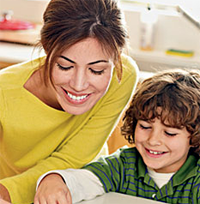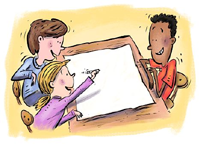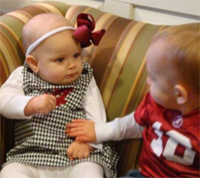SAY NO AT TIMES These days we see kids fidgeting with IPads, Cellphones, Laptops, and other devices, they are no more only for parents. Kids are so busy playing games and watching videos....Once gone are gone, once parents give those devices to the kids, they dont come back to us. Parents should not encourage these things. Never give them to a crying child to divert them. It becomes a habit slowly, they cry inorder to take the Ipad and play. And the result, they dont have any family time, they dont greet the guests when someone visits, which makes the guests comment on the parents and it becomes a talk of the town that you as a parent might not like atall, frequent complaint of boredomand headaches, problems with eyes. Make some rules: Parents dont have to keep saying No to everything but for a few, NO is the only word. When you dont introduce a thing to your child, the child will understand that its not something for him/her. Say "no screens at meals", there are parents who resort to Laptops, TVs, IPads just to make the child eat food. What follows, the child demands to have the TV turned on to eat. Let not you turn prey to the tricks. if your child does something good, dont reward them with ipads, instead buy a good book or take them to play. its the Era of Information Technology, they cant escape gadgets, but atleast save them when at home. "Multiple studies have shown that family meals help kids learn good nutrition and protect against weight problems as well as risky behaviours". Not just meal time, once they come home, they should be used to playing healthy with other kids and not sitting like couch potatoes and playing video games. - Prathyusha Talluri More articles from this author..... NEW MOMMY ME-TIME WRITE ON - FUN
Are you friendly ? Are you friendly?? Generally you are asked to question like this to yourself while dealing with your teenage kids. But have you ever noticed that your friendships and the way you deal with your friends are very effective to your kids while they are engaged with their friends? Yes, you read it right; it is very well known to us that, parents are the best role models to their children. But, now It is also proved that, parents still stand as role models for their kids while socialising too. Especially, when mother has friends, they observe their mother’s behaviour with her friends and try to adopt most of the patterns so very unconsciously. If you are jealous, attitude problem with your friends, kids will catch them and develop such behavioural patterns with their friends also. When you are kind to your friends, helpful and highly approachable, kids will surely learn this from parents and demonstrate such conduct in their friend circle. This means, knowingly or unknowingly you are deifying your child behaviour with their friends so as their circle. Hence try to be polite and warm with your friends and never try to find fault with your friends. This will help you and your children to be happy in life. - M.S.Bhavana
NEW MOMMY ME-TIME Had a baby recently, or been a year or two, nobody needs "me time" more than a busy parent. Here's the scoop on beauty and fashion, including tips, products, and ideas to keep the busy Mom looking good and come out of the low-confidence time of life. Carry a Easy to use Foundation/ Liquid Makeup: It can be even LactoCalamine or any liquid makeup that you trust. Try a Bun: On particularly crazed days, wash hair in the shower and then wrap it in a tight bun to dry. Take it down and your hair is wavy. It looks like you had it styled. Coconut Oil removes mascara/ eye liner/ kajal naturally, and it's a great all- over moisturizer. Baby Wipes are fantastic for cleaning the face on-the-go and for removing makeup when you're too worn out and when there is no time to properly wash the face. Dry Shampoo is so useful if you have realized you couldn't shower whenever you wanted to get your hair clean. Start using TRESemmé dry shampoo, spray it in, let it sit for a few minutes, then brush it out. Carry a cutie: Just dress your baby really cutely and hope people are so distracted by her that they don't notice you. Flaunt a good hair style: Get a good looking hair cut and show off, you will have some confidence to carry yourselves well. Tinted Lip Balms are great -- better than lipstick that dries out your lips and better than super-shiny gloss that your hair gets stuck in. Night Cream: Extra Emollient Night Cream keeps your eyes and skin from being red and puffy, even after long nights spent trying to put the teething or an active baby to bed. - Prathyusha Talluri More articles from this author..... 2 KIDS AT BEDTIME PICKY EATERS
WRITE ON - FUN Let your kid play his/her way to better Penmanship. Encourage the writing habit/ better handwriting/ vocabulary of your kid. New Stories: Write the beginnning of your child's favourite fairy tale or cartoon character story, and ask him/her to finish it. Or give them their favourite or famous character to write a story of their own. Exchange Letters: Set up your own post office scene. Let the child write you a letter on a funny topic or casually before bedtime and drop the letter in the post box. You make sure your write them a reply and ask them to check it in the post box after school time. Sign up your child for a pen-pal service, some libraries and online websites have it. It enables your child to connect to another child of same age who shares similar hobbies/interests. - Prathyusha Talluri More articles from this author..... NEW TEACHER
NEW TEACHER "My Daughter doesnot like the new Teacher and wants to quit going to School. What do i do? " This can be tricky. You want to be sympathetic to your daughter's expereince, but you dont want to convey that she can quit going to school. How many days will she sit at home?! First, sit down and listen to her concerns, which can be 'not liking the classroom as much as last year' or that 'the Teacher is being rude'. Then, it's key to meet with the teacher to try to explore the issue. Start by saying, "I would like to get better understanding of how my daughter responds to the lessons--whats going well and what may not be going so well." Often these situations are due to small miscommunications that snowball, so its a good thing to meet the teacher, discuss and then be able to resolve the conflict altogether. If not, seek the Principal, who can mediate between you and the teacher. If there is still no improvement after a group meeting, its best to consider a transfer to another section---but this should be an option only when other alternatives dont work out. Resolving the issue is so very important, we dont want the child to be depressed and cry everyday not wanting to go to school. Arranging a happy environment at school helps nourish the child's early education and gives so much relief to the parents. - Prathyusha Talluri More articles from this author..... PICKY EATERS SHARE WITH THE DOC
SHARE WITH THE DOC Studies prove that Children with Asthma describe themselves to be doing better than thier parents with the same problem. The result was derived when Children spoke out to the Doctors and were able to explain their symtoms. Encouraging the child to speak openly and honestly to the Doctor is extremely important to diagnose the problem and also to treat it the right way. Removing the fear of the Doctor is critical. Most of the children are afraid of the very thought of a hospital and to see a Doctor. Parents should try to not cultivate that fear from childhood. - Prathyusha Talluri More articles from this author..... PICKY EATERS 2 KIDS AT BEDTIME
PICKY EATERS If your toddler has transformed into a picky eater, its probably a stage every child goes through, nothing to worry too much about nutrition unless the child is loosing weight or has medical problems. Toddlers learn to have opinions, enjoy the decision making ability by starting to reject foods. Turn the table by offering 2 options of only healthy foods, let them select. e.g.,carrots or apples. Toddlers learn to have control on the situation. they want to see your expressions, feeling after they reject things. Maintaining an expressionless face is the trick parents should follow. They experience peer pressure. If they become friends with another picky eater, or with a child who eats more junk food, that friend might tease your child for eating boring, healthy stuff. Your child ends up not eating that boring food to escape from the teasing. Introduce them to healthy eaters and things will get better. Its important you let your child know that you are not against the Treats or Sweets. but let them know there is a time for such special, fun food. If there are 2 or more children at home, the elder ones' eating habits influence the younger's too. Their better and healthy food habits help you to have a healthier younger one at home. - Prathyusha Talluri More articles from this author..... 2 KIDS AT BEDTIME
2 KIDS AT BEDTIME You may not be ready to give up on your Elder child's sleeping routine that took your energy/ hours/ sleepless nights once the Second one arrives.. Managing these 2 li'l ones together at Bedtime is not atall easy. but Pros have the solution. Your Goal: Develop a bedtime regimen for the new baby when it's hard enough getting your toddler down, take your li'l one along when the elder gets ready for bed, read books, sing songs, and the li'l one might listen and listen and dose off too. if not asleep, as long as you are talking or singing, he/she will keep listening and be engaged. Feed the baby if you do before bedtime, while you read a story for the elder one. Take the help of the toddler and say "We are going to teach the baby how to sleep happily and sleep better." Let them both share a common space so that the elder one gets used to the li'l ones crying but still sleeps well. Appreciate your toddler everytime he/she helps you soothe the younger one. Multi-tasking is the key...you have to learn and make sure you are doing more than one thing at a time, you might have learnt already, now is the time to do more than 2 jobs at a go. - Prathyusha Talluri More articles from this author..... NURSING FACTS-2 NURSING RIGHT-3
NURSING FACTS-2 All over the World, Health Organisations promote breastfeeding to give babies the best possible start in life. New parents these days are accepting the fact and are preparing to offer the best to their babies. Health benefits to the Mother: Earlier return to pre-pregnancy weight Decreased risk of breast cancer Decreased risk of ovarian cancer Possibly decreased risk of hip fractures and osteoporosis in the postmenopausal period More rapid return of the uterus to pre-pregnancy size Increased child spacing due to delayed resumption of ovulation and menstruation Protective effect of human milk against : Sudden Infant Death Syndrome (SIDS) Diabetes Cancer in the lymphatic system Leukemia Hodgkin Disease Overweight and Obesity High Cholesterol Asthma BreastMilk reduces the incidence/severity of : Diarrhea Respiratory Tract Infection Ear Infections Bacteria in Blood Bacterial Meningitis Urinary Tract Infection Severe inflammation of intestines and colon Economic Benfits to the Nation : Lower incidence of child's illness allows parents to work more and earn more Saving money during the first year as parents donot have to spend on formulae(milk powder) Significant savings in health care costs for the family Decreased environmental burden for disposal of formula cans, bottles. Never thought this wonderful moms' job has so much effect on the society too!! - Prathyusha Talluri
NURSING RIGHT-3 My expereince came a long way,.Lot of preparation, many books read, many expert suggestions, doing it the wrong way and learning the hard way...still, why should another New Mom suffer! These articles on Breastfeeding are my BabyShower Gift to all New Moms i know and i never met!! You know Breastfeeding is Going Well When... Your Baby is gaining weight: Milk that comes first is Mother is comfortable after nursing: After the mature milk comes in, the breasts feel soft and comfortable, there are no lumps or engorgement. You can nurse comfortable in various positions: Lying down or sitting, with the baby in cradle or football hold position. Baby doesnot take too long to latch comfortably: Baby should put areola and the nipple into the mouth, not just the nipple. Baby nurses at least 8 to 12 times each 24 hours ( about every 1.5 to 3 hours). Baby has 1 or 2 bowel movements the first day and gradually increases to 4 or more per day as the mature milk comes in: the color changes from sticky- green to yellow by the end of the first week. - Prathyusha Talluri More articles from this author..... NURSING RIGHT NURSING RIGHT-2
NURSING RIGHT-2 To be able to breastfeed is an eternal Gift! It can take many days to finish talking on Nursing Right. The more often you nurse your baby, the more milk you make. Your body sends out a harmonal signal preparing itselves to make more milk. Newborns should nurse atleast 8-12 times in 24 hours. Sitting and nursing is a healthy way to avoid back aches..however, you will have to sit up straight even in the middle of the night, when sleepy. still on the long run, it is a good way. If you are experiencing Nipple pain during nursing, it is caused by poor latch or positioning or too much feeding on one side. Observe the total time your baby is feeding, it should be 30-45 minutes, distribute the time equally between the 2 sides, for example.,15minutes on the left and then next half on the right side...the next feeding session should start with right side as you ended there earlier. End the feeding when the baby wants no more; do not let the baby sleep while still drinking and the nipple in the mouth. Be sure to put your right little finger into the baby's mouth and break the suction before removing the baby from the breast. Suddenly pulling the baby off will tend to cut the areola. Air dry nipples after nursing. If they are sore, apply one of the following to the nipple and areola: Warm, moist hot towel compress, expressed breastmilk (it has natural healing ability) hydrogel pads, or hospital-grade lanolin. If you have not got a chance to nurse, either due to being outside or due to work, breasts might become heavy and plugged ducts might form, which are painful (similar to blood clots): Apply warm compress or take a warm shower, begin feeding on the affected side, massage the breast while nursing to melt the ducts, wearing loose innerwear might give relief. More to come!! - Prathyusha Talluri More articles from this author..... NURSING RIGHT NURSING FACTS THE FIRST FEW HOURS
NURSING RIGHT As long as the Newborn and the New Mom are in the Hospital it is well, they get all the help. Just a press of a button or a call and the Nurse comes running to help. The Bed is comfortable, Whenever the Baby cries, the Nurse offers relief by taking the li'l one to the Nursery and Mom and others get to take some rest. Normally, people want to go home from the Hospital environment but after Child birth, every Mom feels she could have stayed few more days, all because of the special kind of help she gets there. The Baby is now trying to get used to the Home environment. Make sure the home temperature is moderate, not too cold or too hot. Arrange a comfy place where you can sit and nurse, and also to be able to sleep without troubling your sore tummy. Too cushiony sofas, chairs, beds might not be comfortable for you now. Arrange a bed with firm mattress, and a special cradle for the Baby, inorder that the Baby is sleeping beside you sametime, you both have enough space. Take Vitamins/minerals regularly, nursing is one medium to pump nutrition into the Baby's body. When Mom is ready to nurse, she should have already ate/drank enough, sit straight, arrange a firm pillow to bring the baby's level up, rest the baby on the pillow, make sure the Baby's tummy is face to face with Mom's tummy. Keep watching that the baby's nose doesnot get pinched, to be able to breathe well. The Baby and the Mom are hungry every 2.5 hours. Feed the baby everytime he/she is hungry, without setting up a timetable and once sound asleep beyond 3hrs of gap, make sure they are awaken to have milk, even in the midnight. It is not good for the Mom to start having solid foods until atleast 3 weeks after delivery. Nausea might spring up as the body is not ready to digest normally. These are not it! We will return with few more valuable tips/ facts on Nursing the right way. - Prathyusha Talluri More articles from this author..... http://teluguone.com/vanitha/content/first-few-hours-baby-birth-76- 25270.html#.UpA6xSeUWEA http://teluguone.com/vanitha/content/pediatric-and-child-76-24999.html http://teluguone.com/vanitha/content/ways-to-keep-baby-healthy-76- 25013.html http://teluguone.com/vanitha/content/how-to-care-for-new-born-babies-76- 25220.html#.Uo3MHyfQtQA
THE FIRST FEW HOURS Doctor gave you the Wonderful news of your Li'l ones arrival, you can listen to his/her voice.....the very thought is still exciting to me! After an hour from the delivery, finally the Nurse brings your Treasure to you. This is called Kangaroo Care. Research proves that Babies when allowed to have skin to skin contact with parents during the first few hours of birth, develop a stronger emotional attachment with them. You can request the Hospital staff to get the Baby to you soon after you are out of the Operation/ Labor room and let them know that you intend to nurse the baby. Suddenly the baby is hungry, searching everywhere, all fingers inside the mouth..signal that its food time..Mom has to get ready. Take a firm pillow that the hospital provides, or get your nursing pillow. The nurse will make sure she helps you. Initially, Its only a watery, colorless liquid, called Colostrum, with high amount of Antibodies to protect the newborn against disease, low in fat, high in protein. Dont let anyone declare that Milk is not flowing, for the next 3- 4days, its only Colostrum, its so useful and valuable for the Baby's next few months. The baby will cry, not giving you enough time to grab the pillow, sit properly and get ready to nurse, Hurry up, but Dont Panic..Every 2.5 hrs the baby will be hungry and he/she will take close to 1 hour to suck milk. Keep a watch on the time, you will have 1.5 hrs to relax and soon you have to be ready to nurse any moment. Once the Baby falls asleep after feeding for atleast more than 30mins, put the baby on your shoulder and slowly pat the back, or pat in upward strokes, the baby will burp, sometimes they take 10-15mins to burp, but its important. They also fall asleep soon after drinking for 10mins, wake the baby up and help to drink. The baby needs food to stay active. The first 3 months, baby has to be fed on demand. Get ready to nurse everytime the baby is hungry, between intervals of 2-2.5 hrs. They feel hungry quickly, after emptying the tummy. You will also be hungry soon after nursing, so eating and drinking often is very important. Never feed while you are hungry, your body will loose all calcium anyways, your energy reserves will be emptied too. These days, the Hospital staff is taking Moms for a walk a day after either undergoing a C-Section or a natural delivery. Its a good exercise and helps your body come out of that shock and the feeling of numbness. We will return with suggestions on how to handle things when you go home! - Prathyusha Talluri More articles from this author..... http://teluguone.com/vanitha/content/pediatric-and-child-76-24999.html http://teluguone.com/vanitha/content/ways-to-keep-baby-healthy-76- 25013.html http://teluguone.com/vanitha/content/how-to-care-for-new-born-babies-76-25220.html#.Uo3MHyfQtQA
NURSING FACTS Getting ready to nurture the tiny new born!! There are people around us suggesting what not...free advices knock our doors everyday..make sure you follow what is right, and to know the right things, you should research. You have been blessed with 8-9 months, take your time, there are nights you cant sleep, spend those moments reading more and more. gather information, talk to Moms whom you think might have done the right thing...however, you will learn by practically implementing those ideas. Nursing comes naturally to every mom! Believe in this thought. Let not other women disappoint or discourage you by saying "These days, women have to struggle alot to be able to breastfeed the baby, Gone are those days when it came naturally to Moms..blah blah blah"......Dont listen...dont care.. Eating healthy food, having positive thoughts, expecting a happy child, a wonderful future with your Child, will definitely help you. Taking vitamins/minerals daily without fail is very important. Some steps to follow: Apply Olive oil or any other edible oil to the nipples, massage them once every day and night. They will be sore and painful at times, massaging and keeping them moist will give relief. While doing this, smoothly pull the nipple out, let it extend out, do this now inorder for the baby after birth to be able to grab the nipple easily into his/her mouth. Wear the right kindof support inner wear, right from the initial months, even during the months when the size increases. Drink lots of milk, eat whole grains like Quinoa (pronounced Keenva, rarely available in India), Dal/curry made with Drumstick leaves/ Methi leaves. These will give your body enough nutrients to be able to produce milk. Dont discuss about your plan to breastfeed with any and every woman you meet. Only share your thoughts with your close/ trusted ones who care for you. Remember, not everyone gives you the best suggestion. I am writing these because i went through the same stage recently and there were people who discouraged me. We will discuss the right ways to nursing in the coming articles!! - Prathyusha Talluri More articles from this author..... http://teluguone.com/vanitha/content/pediatric-and-child-76-24999.html http://teluguone.com/vanitha/content/ways-to-keep-baby-healthy-76- 25013.html http://teluguone.com/vanitha/content/things-to-do-before-baby-arrives-76- 25162.html#.Uow7zSfQtQA
THINGS TO BUY BEFORE BABYS HOME COMING Shop till you drop....people say this..but what shopping is that without buying things most necessary and helpful. Specially when the New parents are awaiting their bundle of joy's arrival. There is 9 months of ample time. Shopping too early might initally excite the parents but seeing the same stuff lying around for few more months will make you feel those items are boring and not so new, and become dusty too....i suggest you start buying after Mommy is 7 months heavy. at this stage, some parents already know the gender of the baby,and there is more excitement/ exactly enough time to get things ready. However, delaying to buy necessary stuff in the later stages, when Mom's 9 months and counting, is not suggestible as Mom's feeling heavy and not able to walk easily. Online shopping is better at this stage. Some items to buy before you head to the hospital, as you need them right from the 1st day of the Baby's arrival and sametime, you will not be left with time to go shopping later. Nursing Pillow.....try the Mombo pillow than the soft ones. Its firm side is useful to place the baby when nursing. Diaper Rash cream, try Pink Salve or the A+D cream, even if you are not using diapers, to avoid rash due to wetness. A bigger size Nursing inner wear..to avoid nipple soreness. A bigger size Tummy Belt..to support your sore tummy after delivery. Use it as directed by the Doctor. Mother's who underwent C-Section Surgery, can use it after 6 weeks only. Good firm Body Support Pillows, for Mom to lean against and also to rest on while nursing and trying to sleep after delivery. Hospital beds are pretty comfortable with adjustable rests, Beds at home dont have that adjustment facility. Our body is not ready to sleep and sit like normal people. Hospitals in USA provide 15-20 extra diapers, we can bring them home and buy the stock meanwhile. Dont buy diapers in advance, you never know what size the baby fits into. There are people who discourage nursing. It comes naturally to all. Even before you attempt, dont declare you can't. Be prepared to nurse the baby on your own, not depend on Formulae....our next Article will help you know more on Breastfeeding correctly. All the Best!! - Prathyusha Talluri More articles from this author..... http://teluguone.com/vanitha/content/coming-out-depression-76-25041.html http://teluguone.com/vanitha/content/preparing-for-babys-arrival-76-25073.html
IS HOME GETTING READY FOR THE BABYS ARRIVAL? Mom-to-be has waited and waited, she watched too many Baby videos on the internet, she is so anxious to see her Child's face...just can't wait enough. Preparations start at home, hospital bag is ready, baby clothes are ready, the cradle is waiting and lo, Mom wants to start cleaning! Isn't she getting tired less?! Though she can't bend and be active, still something tells her the house has to be ready for the Baby. She knows the baby doesnot bother much, still the very determination on decorating the house, cleaning everything is so strong, no one can stop her. These strange moments dont come to all Moms. But, even i expereinced it. I cleaned the whole refrigerator at 15days more to full term, with the idea that my Baby should not find any dirt at home...i was dreaming to show every room to the Li'l one soon after coming home. My mind ddnt allow me to feel tired of all the cleaning at that stage. However, body gets tired. Dont stress out, better take some help in cleaning. I wouldnot say "DONT CLEAN", i know NOTHING CAN STOP YOU, infact if someone stops you, you will only end up crying that night, complaining that no one is bothered about the Baby's Home Coming...blah blah..on and on! I know you are getting ready for your baby's arrival, however, Mom's health is Baby's health. Your main focus should be on going to the Hospital and giving birth to a healthy Baby. Clean, the house and surroundings should definitely be neat and tidy for the Baby hygiene. There are people to help you. Who doesnot want to help an Expectant Mom ! - Prathyusha Talluri More articles from this author..... http://teluguone.com/vanitha/content/milk-allergy-symptoms-76-24978.html http://teluguone.com/vanitha/content/ways-to-keep-baby-healthy-76-25013.html
మీ పిల్లల ప్రత్యేకత ఏంటో మీకు తెలుసా..? మీ ఇంట్లో పసిపాపాయిని ఎప్పుడైనా గమనించారా! అల్లరిగా నవ్వుతూ..హాయిగా ఆడుకుంటూ ప్రపంచంలోని ఆనందం అంతా తన కోసమే అన్నట్టుగా కనిపిస్తుంది. అ నవ్వు, అ అల్లరి ...అ చిన్నిరూపం మనకి ఎన్నో నేర్పిస్తాయి...కొంచెం మనం గమనించగలిగితే.... పసివారి ప్రపంచం నిండా...ఎప్పుడు సంతోషమే...చిన్న చిరునవ్వు ఎప్పుడూ అలా వారి పెదాలపై కన్పిస్తూనే వుంటుంది. అందుకే పిల్లల్ని చూడగానే మన పెదాలపై నవ్వు విరిసేది...వారిలా మన పెదాలపై కూడా నవ్వు విరిస్తే ఆ నవ్వు ఎదుటివారి పెదాలపై కూడా పాకి...అలా అలా...వైరస్ లా అందరిని నవ్వులతో ముంచెస్తుంది...so పిల్లల్ను౦చి మనం నేర్చుకోవలసిన మెదటి పాఠ౦ ఈ చిరునవ్వే. ఇక "నాకు ఇదుంటేనే ఆనందంగా వుంటాను" అన్న బాధ ఉండదు పిల్లలకి - చీపురు పుల్లతో కూడా ఆడేసుకునే నేర్పు వారి స్వంతం - కుర్చితో కారు ఆట, కర్రతో గుర్రం ఆట ఇలా...వాళ్ళకి నచ్చిన ఆట ఆడేస్తుంటారు..ఆనందంగా వుంటారు. "దొరికిన దానితో ఆనందంగా ఉండగలగటం" ఎలా అన్నది పిల్లల నుంచి మనం నేర్చుకోవలసిన రెండవ పాఠ౦. కొత్తగా మాటలు నేర్చుకొనేటప్పుడు పిల్లలు వారికి వచ్చీరాని మాటల్నే పదేపదే అందరి ముందు చెబుతుంటారు. మాటలే కాదు...వాళ్ళు కొత్తగా ఏం నేర్చుకున్నా... దీక్షగా వాటినే ప్రాక్టిస్ చేస్తుంటారు...నడక నేర్చుకొనేటప్పుడు పడిపోతే లేస్తారు...మళ్ళీ ప్రయత్నిస్తారు. ఇలా వాళ్ళ ఎదుగుదలలో నేర్చుకోవలసిన ప్రతీ అంశాన్ని దీక్షగా, ఏకాగ్రతతో నేర్చుకుంటారు, వచ్చేదాకా ఊరుకోరు...'ఓటమి' అస్సలు నచ్చదు వాళ్ళకి..మన అదిలింపులు, బెదిరింపులు, ఏవీ వాళ్ళని ఆపలేవు. ఆ దీక్ష, ఆ ఏకాగ్రత, ఆ పట్టుదల ఇవి చాలు ఓ మనిషి తన లక్ష్యాన్ని చేరటానికి ..పిల్లల నుంచి మనం నేర్చుకోవలసిన మూడో పాఠ౦ ఇది. పిల్లలు అల్లరి చేయగానే విసుక్కుంటాం..ఒక్కోసారి తీవ్రంగా మందలిసస్తా౦....ఓ దెబ్బ కూడా వేస్తాం...పాప౦ వాళ్ళ memory ఎంత తక్కువంటే ...అమ్మ ప్రేమగా దగ్గరకు తీసుకోవగానే టక్కున అన్ని మర్చిపోతారు. మనకీ అలాంటీ short memory ఉంటే ఎంత బావుంటుందో కదా! నచ్చని విషయాల గురించి మనమేమో...ఎవరైనా ఓ మాట అంటే పదే పదే గుర్తుచేసుకొని, వారిని ద్వేషించి...మనం బాధపడి ఎంత తత౦గమో... simpleగా పిల్లల్ని follow అయితే ...నచ్చని వాటిని టక్కున మర్చిపోవటం మనం నేర్చుకోవలసిన నాలుగో పాఠ౦. ఇలా పిల్లల నుంచి మనమేం నేర్చుకోవచ్చు... అని మనం ఎన్నీ చెప్పుకున్నా ....వాటిని అలా చదివి ఇలా వదిలేస్తే ఏం లాభం చెప్పండి...నేర్చుకోవటం, నేర్చుకున్నదానిని ప్రయత్నించటం పిల్లల నుంచి నేర్చుకోవలసిన ఐదవ పాఠ౦. నేర్చోకోవటానికి ఎప్పుడూ సిద్దంగా వుంటారు పిల్లలు...అందుకే మనల్ని గమనిస్తూ చాలా నేర్చుకుంటారు. నేర్చుకోవలనే తపనే వుండాలి కాని పైన ఆకాశం కింద భూమి...ఎగిరేపక్షి, పాడేకోయల ఇలా అన్నీ మనకి జీవిత సత్యాలని నేర్పించేవే.... ఇదే పిల్లల ఆనందానికి సీక్రెట్... ఇదే పిల్లల్లోని అమాయకత్వానికి కారణం. వాళ్ళకి ఇగోలు లేవు. నాకే తెలుసన్న అహంలేదు.. నాకేం రాదన్న భయము లేదు.. అందుకే వాళ్ళు పిల్లలు ...దేవుని ప్రతిరూపాలు... మరి అ పిల్లలకి Children's Day సంధర్బంగా జేజేలు చెబుదామా! - రమ
COME OUT OF DEPRESSION! Every human is not so open to invite changes...though we are prepared for them, waiting for them, still when the time comes, we hesitate to accept those changes. I have to write a disclaimer now!...What we are going to discuss now may not happen with every new Mom. Dont force your mind to think of it. Spend every day Happily. Pregnancy comes with lot many surprises and challenges too! Hormonal changes are the cause, many a times. Delivery has its own clauses. Suddenly you dont like your tiny baby, the sweet li'l one of your dreams. Reasons, unknown. You feel like crying, you are irate, you shout at your husband..... Sametime, these extreme mood swings are not common, not every new Mom feels this way. If you or someone you know is depressed after delivery, just know one thing, you are not letting it affect your life. it is not going to stay with you forever. These feelings arise due to constantly staying in one room, nursing the child often without rest, feeling feverish due to bodily changes, seeing a crying baby beside you, restless days and nights, your body still in pain after the delivery, spending without any contact to the World, your most comfortable routine, disturbed. To feel better,there are some options.. Have the people you like, around you. Let your closest friends come and visit the baby..but make sure the environment is not infected by any means. Watch good movies, read books on Child care, these are your times of great interest in those topics. Get help in cooking, you should be constantly eating to regain strength and nurse often. If you have gained so much weight, dont worry. let not people bother you. That weight will disappear once you start doing things on your own after Grandma's gone. Cover your self, with sweaters, ear muffs, socks..those sudden chills are common after delivery. Warmth will give you relief. Dont sit and think about feeling depressed. Keep yourself happy. Run away from idle thoughts. Better have a Handycam and keep capturing those sweet moments with the Baby. - Prathyusha Talluri. More articles from this author..... http://teluguone.com/vanitha/content/hospital-helpers-76-24920.html http://teluguone.com/vanitha/content/pediatric-and-child-76-24999.html





















